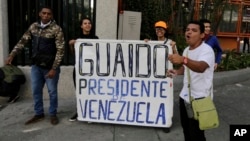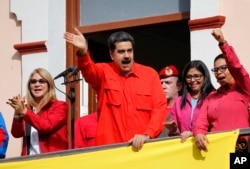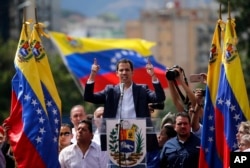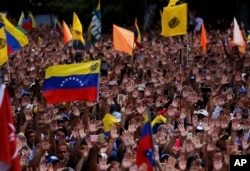Venezuela's opposition party continued to push to isolate the country's disputed president Nicolas Maduro, as an increasing number of countries declared their support for interim leader Juan Guaido Thursday.
Guaido, the president of Venezuela’s National Assembly, declared himself interim president during a day of mass demonstrations a day earlier.
The crisis in the South American country escalated Wednesday after President Maduro announced he was ending diplomatic relations with the United States, in response to President Donald Trump’s announcement that he was officially recognizing Guaido as Venezuela's interim leader.
Maduro has ordered all personnel at the U.S. Embassy to leave the country within 72 hours. U.S. Secretary of State Mike Pompeo, however, says Maduro no longer has the authority to do so.
Trump bluntly warned Maduro that “all options are on the table” if there is not a peaceful transition to democracy in the South American country.
More sanctions possible
White House officials emphasized that Trump is not ruling out any response, such as a naval blockade or other military action, if Maduro unleashes violence against protesters or takes action against Guaido.
The most immediate action by Washington likely would be enhanced sanctions against members of Maduro's government.
"In our sanctions, we've barely scratched the surface on what actions the United States can take," said a senior administration official.
Several nations have joined the U.S. in recognizing Guaido as Venezuela’s interim president, including Canada and 11 of the 14 members of the newly formed Lima Group of Latin American nations, among them Argentina, Brazil, Chile, Colombia, Costa Rica, Guatemala and Peru.
French President Emmanuel Macron called Venezuela's elections "illegitimate" in a tweet on Thursday, and saluted the bravery of Venezuelans demanding freedom.
United Nations Secretary-General Antonio Guterres warned Thursday the situation in Venezuela could descend into “disaster” if the country’s main political rivals fail to reach an agreement.
Speaking Thursday at the World Economic Forum in Davos, Guterres said the U.N. hopes “dialogue can be possible, and that we avoid an escalation that would lead to the kind of conflict that would be a disaster” for the people of Venezuela and the region.
Warnings from Russia, China
But officials in Russia, one of Venezuela’s biggest allies, reacted with anger Thursday at the United States and other Western nations for backing Guaido, accusing them of interfering in the country’s internal affairs. Russia's Foreign Ministry warned the United States against any military intervention, saying such a move would have "catastrophic" consequences.
China urged the United States to stay out of the crisis. Beijing and Moscow have extensive economic interests, having loaned Caracas billions of dollars.
Bolivia, Cuba, Iran and Syria also have issued statements throwing their support behind Maduro.
The three member nations of the Lima Group that have not supported Guaido are Guyana, Saint Lucia and Mexico.
"From a constitutional, humanitarian, and democratic perspective — and according to international law — there was no option left for the United States and the international community but to recognize Juan Guaido as the interim president of Venezuela," Moises Rendon, associate director and associate fellow of the CSIS Americas Program, told VOA.
Venezuela and its state-owned oil company, PDVSA, are estimated to owe $7 billion on a combined trade debt of about $60 billion. The country's oil-based economy, which is wracked by hyperinflation, has collapsed.
Police lined streets and bridges in Caracas, as opposition protesters threw objects at them and chanted "Get out Maduro" and other slogans.
In the middle-class neighborhood of El Paraiso, National Guard troops launched tear gas at protesters who said they were angry over rising inflation, a shortage of basic goods and a migration crisis that has divided families.
Counter protests also have been organized by the Venezuelan government, which has accused the opposition of provoking violence.
Wednesday's protests coincide with the 61st anniversary of the 1958 coup that overthrew military dictator Marcos Perez Jimenez.










